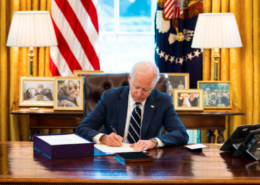State broadband leaders see opportunity for transformational change with at least $100 million coming to each state from the infrastructure law’s Broadband Equity, Access, and Deployment (BEAD) program. States are in planning stages as NTIA prepares to distribute funding, said officials and other experts in interviews after President Joe Biden signed the bill Nov. 15 (see 2111150074).
The infrastructure law’s $65 billion for broadband includes $42.45 billion for NTIA grants to states. BEAD will send at least $100 million for each state and $20 million per territory for expansion or affordability. States can get more, “allocated by need, primarily based” on unserved numbers, said an NTIA fact sheet. The law prescribes a formula, requires NTIA to base unserved designation on new FCC broadband maps, and gives NTIA 180 days to issue a notice of funding opportunity, said an agency spokesperson, adding NTIA is working to release a request for comments soon.
States’ bigger role is welcome, said Michigan Lt. Gov. Garlin Gilchrist (D) and Florida Sen. Loranne Ausley (D), co-chairs of progressive NewDEAL Forum Broadband Task Force. Some past support mechanisms sent money to industry. “Everybody is not yet connected, which means that we need more people and more collaborators at the table, including the state,” Gilchrist told us. States know best because they’re close to the problem, said Ausley in a separate interview.
Gilchrist said $100 million could be “transformational” for Michigan, bringing fast connections to 400,000 Michiganders in rural, urban and suburban communities. Michigan established a High-Speed Internet Office this year that will be the state’s single point of contact, he said. Expanding broadband is “important and urgent,” said Gilchrist: “We want to be smart” and “move responsibly” but also quickly. Michigan will closely watch NTIA to see how much money it can get beyond the base, said Gilchrist. “We will be offering input and suggestions ... about how those resources can be most effectively invested here. ... We’re certainly advocating for everything we can get.”
“This is critical funding,” agreed Ausley, who represents 10 rural counties. Considering state legislators “passed a grant program last year and did not fund it at all, $100 million would go a long way.” She expects Florida will get more given its population. State spending will probably be directed by Florida’s broadband office, which should complete a state map by June, she said.
Read more on Communications Daily







